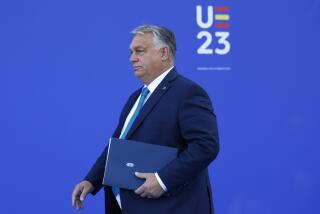Castro Marks Anniversary of Uprising : Cuba: The ailing economy and changing ties with Eastern Europe’s disappearing socialist bloc are topics.
- Share via
HAVANA — Cubans flocked to Revolutionary Plaza on Thursday night for an anniversary address by President Fidel Castro on Cuba’s worsening economic situation and its changing relationship with the Soviet Union.
The occasion was the 37th anniversary of Castro’s debut as a guerrilla fighter, an event commemorated with a three-day national holiday.
On July 26, 1953, a small rebel force led by Castro forces attacked the Moncada military barracks in eastern Cuba, marking the definitive start of the armed fight against Fulgencio Batista, which culminated in the dictator’s fall Jan. 1, 1959.
The Cuban flag adorned buildings throughout the city, and the government-run news media exhorted citizens to attend the festivities.
Castro normally makes his July 26 address in a provincial capital but decided this year to speak in Havana.
In Washington, the State Department issued this statement on the anniversary:
“Tragically, the revolution’s promises with Castro’s assumption of power in 1959 were betrayed. There is little or no freedom of expression in Cuba.
“The regime has just announced that it will no longer permit the International Committee of the Red Cross to visit Cuban prisoners. Three decades after the revolution, the Cuban people are paying a high price for Castro’s devotion to the discredited Marxist model.”
Compared with the anniversary a year ago, the mood in this Caribbean island nation of about 10.5 million people now is far more uncertain.
Collapse of the friendly governments in Eastern Europe has brought an end to the socialist bloc. Grave uncertainty also has arisen about future economic ties with the Soviet Union, Cuba’s chief benefactor.
On Wednesday, Soviet President Mikhail S. Gorbachev told Third World nations that the days of massive subsidies in the name of fraternal socialism are coming to an end and that the Soviet Union will observe the same terms of trade with all partners--Communist or capitalist, friend or former foe.
Castro has held out against making political changes in his one-party Communist state, but he has shown signs of economic flexibility, including moves for private Spanish investors to build hotels on the island.
Castro has warned his countrymen that harsh austerity measures will have to be imposed if the Soviets stop sending 13 million tons of oil a year to Cuba.
Another concern is growing food scarcities. Many Cubans say they can’t recall when food supplies have been more meager.
In recent days, the government also has had to deal with a wave of break-ins at foreign embassies by asylum-seekers. Eighteen Cubans are at the Spanish Embassy and four at the Italian ambassador’s residence.
The government says they will not be granted safe passage out of Cuba.
For all his problems, Castro’s rule still is without serious challenge. He continues to have a strong base of support, and representatives of the small dissident community here are either in prison or have been cowed into silence.
Spain’s foreign minister, Francisco Fernandez Ordonez, meanwhile, left Madrid for Peru to attend Saturday’s inauguration of President-elect Alberto Fujimori.
Castro also will be in Lima, at a time Spanish-Cuban relations have eroded over the asylum-seekers issue. But Fernandez Ordonez told reporters no request was made for a meeting with Castro nor did he foresee one taking place.
More to Read
Sign up for Essential California
The most important California stories and recommendations in your inbox every morning.
You may occasionally receive promotional content from the Los Angeles Times.













